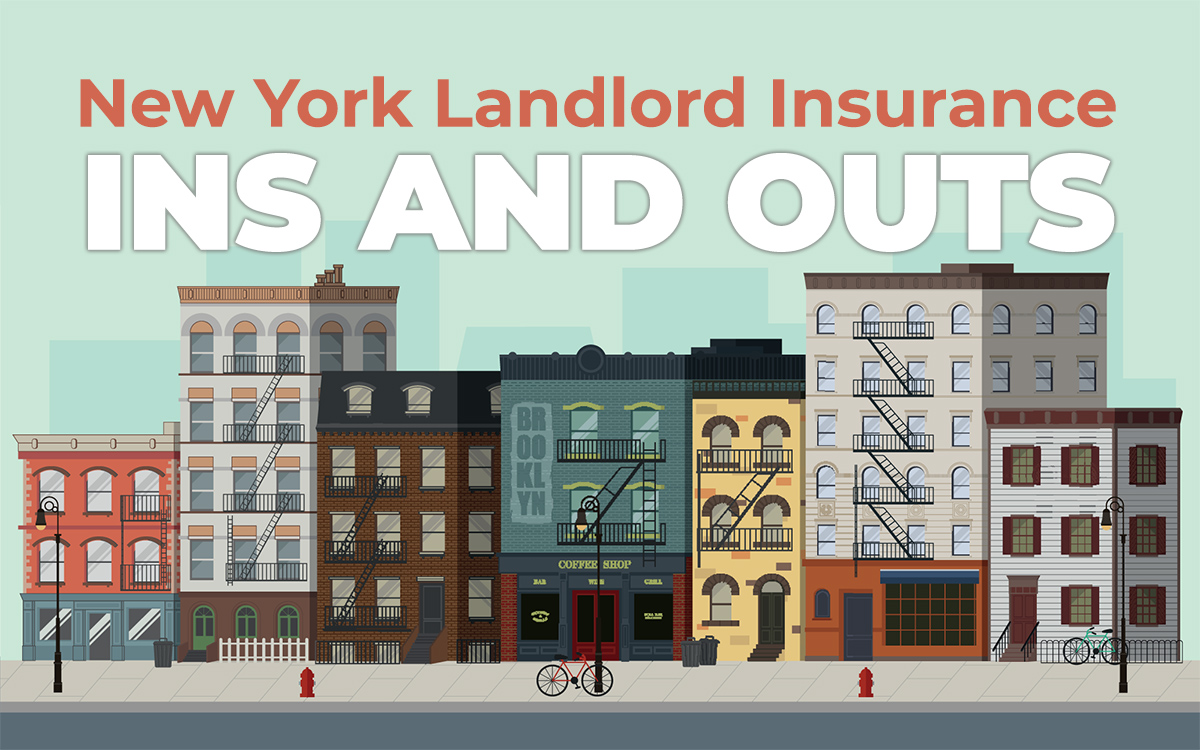The Ins and Outs of New York Area Landlord Insurance

Protecting your real estate investment in the Greater New York City area begins with the right landlord insurance. Landlord insurance can help pay for property damage due to storms or other disasters, cover repairs in the event of a fire, and protect you from liability. This protection can also compensate you for lost rent if a fire or other covered event makes units uninhabitable.
If you’re wondering whether you truly need landlord insurance, the answer is “yes.”
Your lender will require landlord insurance. In fact, they will probably specify the type and amount of coverage you need (at your expense, not theirs). Even if you don’t have any loans or liens against the property, insurance can mitigate a potentially devastating loss.
This article will help you protect your investment without spending more than necessary.
New York City Landlord Insurance: A Specialized Market
If you own a multifamily brownstone or apartment building in New York City, you might have encountered some challenges when researching landlord insurance options. Namely, many of the national companies that advertise New York landlord insurance don’t insure properties in the five boroughs.
New York City is unique in many ways. From the challenges of insuring brownstones and other historic properties to the complex building codes and landlord requirements, property insurance in the Big Apple is highly specialized. Similarly, you’ll want to work with a partner who specializes in insuring New York City properties. As insurance players and programs come and go, and underwriter ratings rise and fall, a knowledgeable partner will track these changes to make sure you always have the right coverage for your unique needs.
The Basics: Three Types of Policies
Before considering any additions to your insurance policy, the first decision is what level of protection you need.
Basic Form Coverage
This policy type only covers a limited number of perils specifically named in the policy (such as fire). These perils will vary slightly from one company to another. A claim will result in payment of Actual Cash Value (ACV), which is the actual depreciated cost of an item. For example, if a hailstorm tears the roof off your rental property and the roof is 15 years old, insurance will pay the depreciated value of the materials. If it cost you $15,000 to replace the roof 15 years ago, insurance might only pay $7,500 because the materials have depreciated by 50%. (These numbers are for illustration purposes only.) This is the cheapest insurance available for landlords for good reason.
Broad Form Coverage
This is also a named peril policy, though the list of named perils is more extensive. The most important upgrade from a basic form policy is that, if endorsed, this level of protection will pay replacement costs, not ACV. If it would now cost $25,000 to replace your roof, that’s what your insurance will pay (minus your deductible). Note that broad form policies will often not cover damage to properties that have been vacant for more than 30 or 60 days, depending on the policy.
Special Form Coverage
These policies cover many more perils, to the point that the policy will normally only list the few causes of losses that aren’t covered, such as war, nuclear hazards, governmental action and a few other perils. This policy also includes replacement cost coverage, so you don’t have to worry about depreciation.
An insurance broker can help you choose the insurance policy that works best for you and your property.
Additional Insurance Coverage
Before getting into liability, several optional protections can protect you against other financial losses.
Loss of Rents/Guaranteed Income Insurance
If all or part of your building is unusable because of a covered incident, such as a fire, storm or vandalism, this protection will pay you your rental income while your building is being repaired. It will also pay if units can’t be inhabited due to pest infestation or other reasons. There will normally be a time limit, such as 12 months. This insurance will not cover you if you lose rent due to landlord/tenant issues.
Other Perils
Some perils, such as damage caused by flooding, tornadoes or earthquakes, may not be covered in a standard policy. That coverage can be added.
Water Liability/Sewer Backup
Water damage caused by sewer backups isn’t unusual; it’s well worth adding this coverage.
Ordinance or Law Coverage
If part or all of your building is damaged, your policy will cover the costs of rebuilding it to its former condition. But if building codes or other regulations require that the construction meet new standards, this ordinance or law coverage will make up the difference. With certain policies, lost income resulting from construction delays may be covered as well.
Liability Insurance
Liability insurance provides protection if someone files a suit against you. Tenants can sue landlords for injuries or death. Visitors and tradespeople can sue for the same reasons. If found liable, a landlord can be on the hook for medical, legal and other costs.
Determining liability typically comes down to the landlord’s negligence. If someone slips on icy steps, for instance, or has an allergic reaction to stings from bees living under the eaves of your building, that person may have a legitimate claim against you.
To reduce your potential liability:
- Keep your property in good condition. · Inspect the property regularly and perform routine maintenance.
- Stay up-to-date and compliant with all building and safety codes. A good starting point is New York City’s Department of Housing Preservation & Development (HPD)’s housing information guide.
- Make sure the property does not contain lead paint, radon or carbon monoxide.
- Make repairs promptly.
- Prepare your property for winter hazards, and clear snow and ice promptly.
- Keep your property secure with deadbolts, good lighting, secure doors and other security measures.
- Please note that, if you fail to properly care for your property, the insurance company may deny your claim. For a more comprehensive list of potential liability, please review Insurance Journal‘s “10 Things You Should Know About Landlord Liability and Exposure.”
What to Know Before Buying Landlord Insurance
Here are the questions an insurance company will ask and the information an insurer needs to provide a quote:
- What is the replacement value of your property? (If your property is destroyed, what will it cost to rebuild?)
- What is your current or projected rent roll?
- What personal property do you have in the building? (Including, for example, washers/dryers provided for tenant use)
- Do you live in the building?
- What safety items are installed? (You’ll need to provide proof.)
- How many rental units are in the building?
- How old is the building?
- What condition is the building in, and what materials were used in its construction?
- How close is the building to natural risks, such as areas prone to floods?
- Do you allow tenants to smoke in their units or in common areas?
- Do you allow short-term rentals?
Your insurer will look at other factors, such as crime rates and changes in area property values. You’ll likely also have a property inspection. If this isn’t your first commercial policy, or you own other buildings, the insurance company will consider your claims history.
Another factor to consider is the deductible, the amount you’re required to pay out of pocket before your policy covers any costs. Like other types of insurance, the higher the deductible, the lower the premium. Think about how much you can cover before filing a claim.
Note that some insurance companies will offer discounts if you have multiple policies with them, such as bundling homeowners, landlords and auto insurance.
How much liability insurance should you carry? Again, a good broker can help. More is better. Even if someone is injured in a tenant’s apartment and sues the tenant, nothing will prevent that person from suing you as well.
Insurance for Tenants
Landlord insurance protects the landlord, not the tenant. If a fire damages a tenant’s property, the apartment contents will not be covered, unless the fire resulted from landlord negligence. Many landlords require tenants to purchase insurance and to provide proof of insurance before moving in. This practice especially makes sense if you allow pets in your building and the tenant owns a dog.
Even if you don’t require your tenants to purchase insurance to protect themselves, at the very least, inform tenants in writing that you recommend they purchase insurance to protect their own belongings and liability.
Landlord Insurance = Tax Savings
The good news is that landlord insurance premiums are deductible as a business expense as a legitimate cost of doing business. To avoid issues, make sure that legal ownership of the building matches the name on the landlord insurance policy.
Having a landlord insurance policy with liability coverage can go a long way toward giving you the peace of mind that comes with knowing you have a safety net in place, just in case. Hopefully, you’ll never have to make a claim, but you’ll be glad you have it if you do.
To discuss the best policy for your needs as a New York landlord, or for a complimentary review of an existing landlord insurance policy, call us at 877-576-5200.


